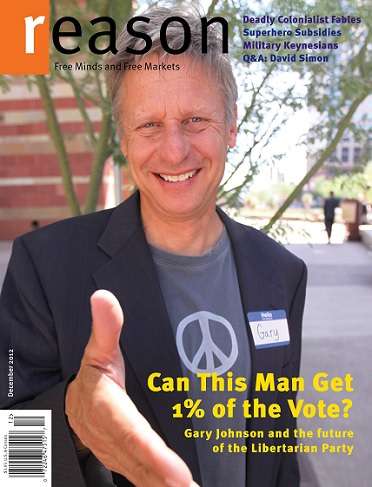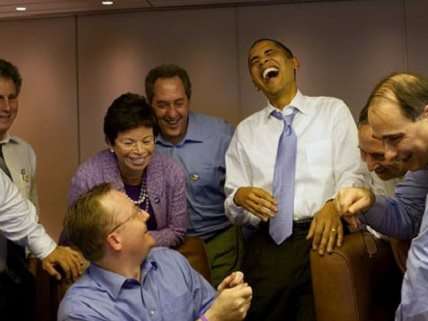Four Big Issues Libertarians Bring to the Table in Elections
Libertarian candidates are crucial for the issues they tackle that Democrats and Republicans have avoided during the 2014 election cycle.


Election Day 2014 is just two weeks away and Libertarian candidates are going to be a factor—just as they have been throughout the election cycle. There are 37 "top-line" Libertarian candidates—candidates in statewide, top-of-the-ticket races—across the country, with several polling above the spread and a few even allowed into televised debates. As Brian Doherty notes, final results are unlikely to be as optimistic as current polling. However, the growing popularity of Libertarian candidates is indicative of the growing importance of issues and positions championed by Libertarians. The issues Libertarians bring into the spotlight when they run for office aren't issues that are going away with the end of the election cycle, and you can even expect some of them to be adopted by candidates from the two major parties.
1. Marijuana Legalization
It used to be derogatory—libertarians are just a bunch of pot-smokers who want to legalize weed. Now it seems prescient. That transformation of a core libertarian platform position from something considered a quirky and unrealistic policy objective to cutting-edge policy has helped create this Libertarian Party moment, as Brian Doherty observed earlier this month.
While marijuana legalization is becoming more popular among the electorate, and legal in places like Colorado and Washington, it is still widely resisted by the two major parties. Colorado's own Democrat governor, up for re-election in November, has been going around the state calling voters' decision to legalize "reckless" (he doesn't like that Colorado tried a policy no other state's tried before).
Or consider Florida, where the Republican governor Rick Scott is facing former Republican governor turned Democrat Charlie Crist. Crist says he's voting for an amendment on the ballot to legalize medical marijuana as an issue of "compassion." But when a left wing group attacked Crist for supporting some of the "harshest marijuana laws in the country," PolitiFact rated it Mostly False because… the harsh laws he signed were almost unanimously supported, meaning they were backed by Republicans and Democrats in the state legislature. It's the same story around the country—and Libertarians provide an alternative.

2. Civil Liberties
Between Edward Snowden's revelations and the fallout from Ferguson, a wide array of civil liberties effort have come into the forefront of the national political debate. While many Democrats, and some Republicans, claim to be civil libertarians, few follow through in office. In June just 62 members of Congress, and only 43 Democrats—who belong to the party that's most brazenly tried to claim the "civil libertarian" label—voted to limit militarization of American police forces. And in New York City, a series of high profile incidents of police brutality didn't move the city's newly-minted progressive mayor to reconsider the petty laws whose enforcement creates the opportunity for the kind of police brutality displayed by the NYPD.
Libertarians are often the only candidates drawing attention to the issues that could limit police brutality—even when they're cops. In Kentucky, Libertarian David Patterson is running against incumbent Republican Mitch McConnell and Democrat Alison Lundergan Grimes. Patterson is an 18-year police veteran, who said in an interview that he preferred the term "peace officer" to police officer. "Police is really synonymous with…" he told the National Journal before cutting himself off. "Well, it's got a negative tone to it."

3. Crony Capitalism and Actually Limiting Government
Crony capitalism is a favorite practice of establishment Republicans and Democrats, who tend to view government and the offices within government they can acquire as a way to enrich themselves, their friends, and their special interests. Republican Texas Gov. Rick Perry, not running for re-election in November, has touted Texas' relatively economically libertarian policies for the state's economic successes. But even in Texas, crony capitalism gets mileage. Perry set up a public money "venture capital fund" to spend more than $200 million on as many as 100 companies.
Democratic and Republican politicians tend to enter into and cultivate various relationships inside and outside government to help them acquire more political power. It's basic self-interest at work—no matter how much the lady doth protest. When politicians push for limits on campaign spending to prevent corruption, it really is a case of "takes one to know one." The politicians don't consider the revenue streams they've already created for themselves as the same thing, and know the power of incumbency will protect them.
Libertarians come from outside that political mainstream and are thus in a unique position to challenge the pervasive cronyism in the political system. Democrats and Republicans both look at government and see the things it can do to advance their agendas. Even when winning candidates pay lip service to "limited government," the state apparatus rarely shrinks. In the last fifty years, for example, occupational licensing has been one of the fastest growing "labor market institutions" in the country.
Wisconsin's Republican governor, Scott Walker, up for re-election in November, championed a law several years ago restricting the collective bargaining privileges of public unions—but exempted police and fire unions. He says he won't advocate for "right to work" laws if re-elected. The Meanwhile, Libertarian candidate, Robert Burke (unrelated to the Democrats' candidate, Mary Burke), a former Republican, is running on a platform of the "repeal of laws restricting the production, sale, possession, or use of prohibited drugs and medicines. The repeal of laws regarding a minimum drinking age which are in conflict with the legally recognized age for maturity and responsibility. The repeal of laws restricting consensual sexual relations between adults. The repeal of laws regulating or prohibiting gambling. The decriminalization of assisted suicide."

4. Anti-War Foreign Policy
This issues comes into play exclusively in federal races, but given how much warring the United States has done in the 21st century so far, it's nevertheless important. Libertarian candidates offer the rare authentically anti-war position. Barack Obama's supporters tried to make the Democrat out to be the anti-war candidate in 2008, but he turned out to be merely an anti-war-in-Iraq candidate—and as we've seen recently, even that label is suspect.
Democrats and Republicans both tend to lean heavily toward interventionism, even while many Democrats try to deny it and Republicans attack them for being weak. Where they're present in federal races, Libertarian candidates can provide a contrast to the pro-war positions of the major party candidates. Libertarian Sean Haugh, a candidate for Senate in North Carolina who was allowed into the televised debate, did just that, presenting the only anti-war, anti-tax, anti-debt platform in that election.
"Stop all wars," Haugh told Brian Doherty before that debate. "I wouldn't say it's my single issue but it is one I'm totally focused on and it has implications for so many policy issues. The only solution the Republicans and Democrats have is more bombing campaigns, and our wars helped create even greater problems for us than when we first started."


Show Comments (35)